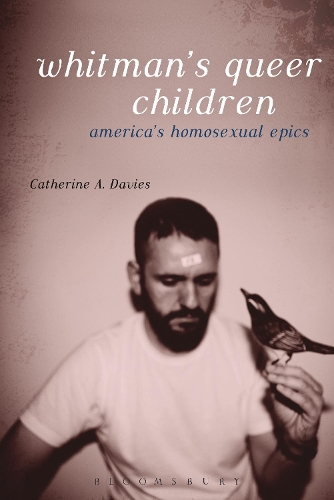
Whitman's Queer Children: America's Homosexual Epics
(Paperback)
Available Formats
Publishing Details
Whitman's Queer Children: America's Homosexual Epics
By (Author) Dr. Catherine A. Davies
Bloomsbury Publishing PLC
Bloomsbury Academic USA
16th January 2014
United States
Classifications
Tertiary Education
Non Fiction
Literary studies: c 1900 to c 2000
811.54093538
Physical Properties
Paperback
232
Width 153mm, Height 234mm
318g
Description
Davies examines the work of four of the most important twentieth-century poets who have explored the epic tradition. Some of the poems display an explicit concern with ideas of American nationhood, while others emulate the formal ambitions and encyclopaedic scope of the epic poem. The study undertakes extensive close readings of Hart Cranes The Bridge (1930), Allen Ginsbergs Howl (1956) and The Fall of America: Poems of These States 1965-71 (1972), James Merrills The Changing Light at Sandover (1982), and John Ashberys Flow Chart (1991). Although not primarily an account of a Whitmanian lineage, this book considers Whitmans renegotiation of the dialectic between the public and the private as a context for the project of the homosexual epic, arguing for the existence of a genealogy of epic poems that rethink the relationship between these two spheres. If, as Bakhtin suggests, the job of epic is to accomplish the task of cultural, national, and political centralization of the verbal-ideological world, the idea of the homosexual epic fundamentally problematizes the traditional aims of the genre.
Reviews
"Why is it that so many of America's greatest long poems have been written by homosexual men In Whitman's Queer Children Catherine Davies brilliantly explores the genealogy of the American epic, and its subtleand not so subtlequeering by Hart Crane, Allen Ginsberg, James Merrill and John Ashbery. Combining incisive close readings with social history and literary theory, this study presents a range of persuasive and fascinating critical perspectives on four of the most significant and influential poets of the twentieth century." -- Mark Ford, Professor of English, University College London, UK
"Whitman's Queer Children looks at 'the anxious relationship between the homosexual and his American home' and vividly shows it to be a source of vitality, imagination and articulate authority in the work of four gay twentieth-century poets. Ranging widely from Virgil to Horace, from Jung to Gans, and dwelling above all on the nurturing adaptable heritage of Whitman, Catherine Davies provides detailed and nuanced accounts both of poetic genesis and cultural situation, and revisits old debates and disagreements with a contemporary perspective. She brings out the sturdiness and resilience of the epic mode, its capacity for odd conjunctions and new bearings, and gives a persuasive narrative of the many forms and potent legacy of the 'homosexual epic'." Peter Swaab, Reader in English, University College London, UK
Davies presents a well-researched analysis of not only the poems, but of the poets, the historical contexts and societies during which they lived and wrote, and, not least importantly, of the ways in which each, in his own way, engaged with the burden of living and writing in the shadow of the man who first (publicly) expressed the need for America to consider a more diverse and inclusive identity. -- Chisomo Kalinga, Kings College London * MakeMag.com *
Author Bio
Catherine Davies received her PhD from University College London. She lives and teaches in London and is currently researching a new project that looks at intertextual relations between poets and musicians.
